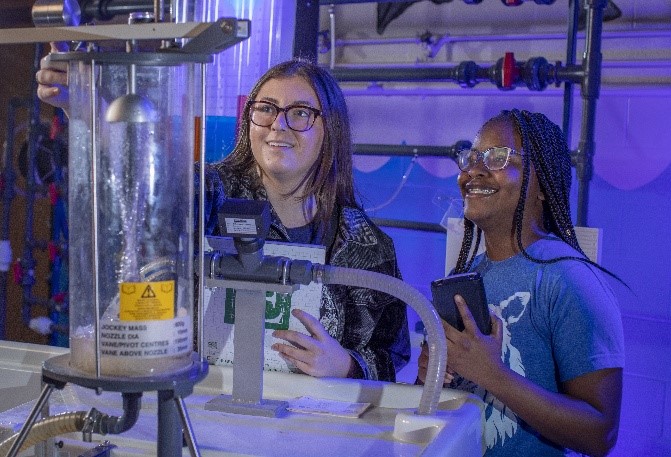Graduate School
How to Balance Research and Practical Application in Graduate School
 By: Dr. Deborah Tollefsen, Vice Provost and Dean of the UofM Graduate School
By: Dr. Deborah Tollefsen, Vice Provost and Dean of the UofM Graduate School
I am a philosopher by training. The common perception is that philosophy isn’t very practical. Hence, the plethora of cartoons about philosophy students becoming baristas. This is a serious misperception. The skills developed as a philosopher are transferable to a variety of different careers and some of life’s big questions have significant practical importance. My own research has focused on collective and group agency which has connections to the theory of corporate personhood in law and corporate responsibility.
It is true, however, that among the many disciplines, philosophy tends to be on the purely theoretical side. I’ve always advised my philosophy graduate students to make sure that they can articulate the ways in which their research has practical importance and to develop communication skills to convey their knowledge outside the academy. For other disciplines the connection between theory and practice is much more direct. But even the most practical of disciplines require a solid foundation in theory and is constantly being infused by the cutting edge research of its scholars.
Graduate studies serve as a pivotal stage in academic and professional development, demanding a delicate balance between research and practical application. This dual focus enriches students’ understanding of theoretical concepts while equipping them to address real-world challenges effectively. Achieving this equilibrium, however, requires intentional planning and a clear sense of purpose.
Research forms the cornerstone of graduate education. Through research, graduate students contribute to the advancement of knowledge, challenging existing paradigms and exploring uncharted territories. Theoretical inquiries foster critical thinking, encouraging students to analyze complex issues and propose innovative solutions. However, research that remains confined to academia risks becoming disconnected from practical realities, limiting its impact.
Practical application, on the other hand, ensures that academic insights resonate beyond scholarly circles. By engaging with real-world problems, students test their hypotheses, refine methodologies, and witness the tangible effects of their work. Internships, industry collaborations, community-based projects, and applied research initiatives provide avenues to ground academic inquiry in lived experiences. These activities not only enhance employability but also demonstrate the relevance of graduate education to societal progress.
Balancing these priorities requires integration rather than compromise. Universities play a crucial role in fostering this synergy by promoting interdisciplinary programs, providing experiential learning opportunities, and encouraging partnerships with industry and public sectors. Faculty mentorship further bridges the gap, guiding students to align their academic pursuits with practical goals. For students, time management and a clear vision for their career trajectories are essential to harmonizing the demands of research and application.
Here is what we do at the University of Memphis to encourage a balance between research and practice application:
- Our Student Research Forum and NEDtalks provide opportunities for students to introduce their research and its impact to non-experts. These are opportunities to develop crucial communication skills needed to articulate to others the questions and methodologies that ground their research.
- Our research centers offer students an opportunity to engage in research that has direct impact on our communities. For instance, the Institute for Agriculture and Conservation Research and Education (ACRE) is comprised of scientists, engineers, farmers, and students who work collaboratively to pursue solutions to critical challenges in food, agriculture, conservation, and sustainability. With a focus on industry alignment, ACRE, addresses issues impacting the future of agriculture and conservation.
- The School of Urban Affairs and Public Policy (SUAPP) focuses on urban policy and solutions, particularly within Memphis and the Midsouth. They also have a research and outreach component that contributes to urban policy solutions. Their graduate programs in social work, criminal justice, city and regional planning, public and non-profit administration are training the next generation of professionals and engaged scholars.
- The Marcus Orr Humanities Center for Humanities brings humanistic inquiry to our community and partners with local community organizations and educational institutions to advance our common commitment to critical thought, intellectual and ethical reflection, and personal expression. Many of our faculty are engaged in digital humanities projects combing humanities research with digital technologies, developing new ways to teach and disseminate knowledge. For instance, Dr. Melanie Conroy, is a digital humanities scholar whose work is focused on the intersection of social networks and geography in literature and the cultural sphere.
- The Memphis Institute for Leadership Education (MILE) provides graduate students with various training that prepares them to become future leaders in the Memphis community. Its director, Dr. Kurt Kraiger, is a national and internationally recognized scholar on workforce training and mentoring. MILE leadership development is grounded in cutting edge research.
- Our faculty work closely with our graduate students on funded research projects that have broad application. For example, Dr. Max Paquette and PhD student Sam Lyons, in collaboration with Dr. Stacey Meardon of East Carolina University, were awarded a research grant from the American Athletic Conference Academic Research Consortium. The grant supports a study which aims to develop practical methods to measure bone forces on the tibia, and to assess how well forces can be measured using wearable devices outside of laboratory settings. Results from this study will help improve methods to quantify tibial bone forces, allowing coaches and medical support staff to optimize training. This research also has implication for military training.
Ultimately, the most successful graduate education combines the rigor of research with the dynamism of practical application. This balance not only cultivates skilled professionals and scholars but also empowers them to make meaningful contributions to their fields and communities. By connecting theory with practice, graduate studies become a transformative experience, preparing students to navigate and shape an increasingly complex world.
Published: April 2025
